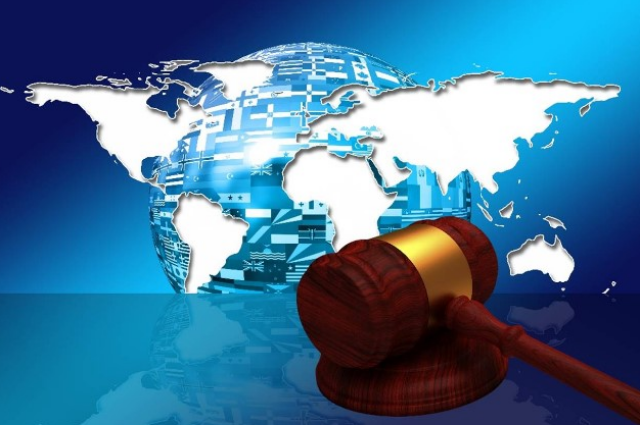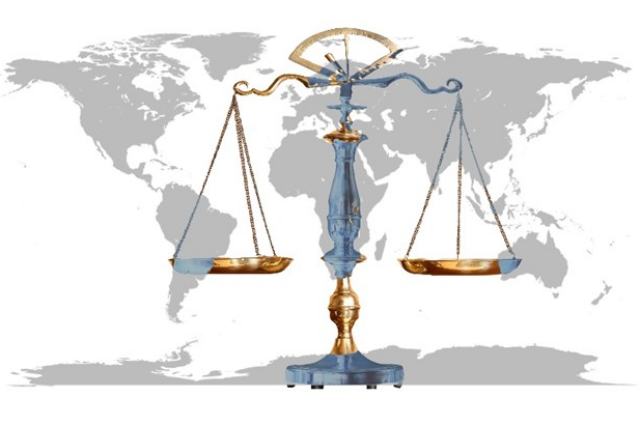“As the world becomes increasingly interconnected, new challenges are arising that pose novel problems for international law. The rise of non-state actors, the changing nature of armed conflict, and the proliferation of technology are the major challenges that question the traditional state-centric approaches of international law.”

INTRODUCTION
International law is a set of rules and principles that govern relations between states, as well as other international actors such as international organizations, non-state actors, and individuals. It is the body of law that regulates interactions between nations and ensures that there is a framework for resolving disputes and maintaining peaceful relationships. The sources of international law include treaties, customary international law, general principles of law, and the decisions of international courts and tribunals. International law covers a broad range of subjects, including human rights, international trade, environmental protection, the use of force, and the settlement of disputes between states. It is enforced by a range of mechanisms, including international courts and tribunals, dispute resolution processes, and the power of states to take countermeasures or impose sanctions. While international law is binding on states, it is not always easy to enforce, as there is no global police force or court with the power to compel compliance.
International law has a significant impact on the global community, as it provides a framework for regulating the relationships between states, as well as the behavior of individuals and organizations across borders. It plays a vital role in promoting and maintaining peace and security between states. Treaties, conventions, and international organizations like the United Nations provide a framework for resolving conflicts between states peacefully. It sets standards for protecting human rights and fundamental freedoms and also provides a basis for holding governments accountable for violations of human rights and for promoting social justice.
Despite the challenges associated with enforcing international law, it remains an essential component of global governance, ensuring that nations and other international actors interact within a framework of rules and norms. The international legal system is facing an unprecedented set of challenges as the world becomes more complex and interconnected. With the rise of new technologies, the changing nature of armed conflict, and the emergence of non-state actors as significant players on the global stage, international law is being tested like never before. This paper will analyze some of the novel problems that are confronting the international legal system, and examine the ways in which it is evolving to meet these challenges.
THE IMPACT OF NEW TECHNOLOGIES
The rapid pace of technological change is presenting a host of new legal challenges for the international community. From the use of unmanned aerial vehicles (UAVs) for targeted killings to cyber-attacks on critical infrastructure, the use of technology in modern conflict is creating new problems that traditional international law is ill-equipped to handle. One of the biggest challenges is the lack of a clear legal framework for the use of these new technologies in armed conflict. For example, there is still no international consensus on the legality of targeted killings using UAVs, which has led to significant controversy and debate. The international community must develop a set of clear and consistent rules for the use of new technologies in armed conflict to ensure that they are used in a manner that is consistent with international law. The development of new technologies has brought about many changes to the way people interact and conduct business. These technological advances have created new challenges for international law, which must adapt to ensure that the rights and interests of individuals and states are protected. One of the key challenges of international law in the context of new technologies is the issue of jurisdiction. With the rise of the internet and digital communication, it has become increasingly difficult to determine which country's laws apply to a particular situation. For example, if a person in one country commits a crime against another person in a different country using the internet, it may be difficult to determine which country has the authority to prosecute the offender.

Another challenge is the protection of intellectual property rights. With the ease of copying and sharing digital information, it has become more difficult to protect copyright and trademark rights. Additionally, the rise of blockchain technology and cryptocurrencies has created new challenges for international financial regulation and taxation.
Privacy is another area where new technologies have loosed significant challenges for international law. The rise of social media and other online platforms has created new ways for individuals to share their personal information, often without fully understanding the implications of doing so. Governments and international organizations are struggling to balance the need to protect individual privacy with the need to prevent crime and terrorism.
Last but not least the development of new technologies has raised ethical concerns about the use of artificial intelligence (AI) and autonomous systems. There is a need to ensure that these technologies are developed and used in a responsible and ethical manner, and international law must provide guidelines and regulations to ensure this happens. It can be summed up that new technologies have created significant challenges for international law. As technology continues to advance, it is essential that the legal framework adapts to ensure that individuals and states are protected, and that ethical and legal standards are upheld
THE RISE OF NON-STATE ACTORS
The rise of non-state actors in international relations, such as non-governmental organizations (NGOs), multinational corporations, and terrorist groups, has created several problems in international law.
One of the main challenges is that traditional international law is designed to regulate the actions of states, rather than non-state actors. This means that international law often lacks the necessary mechanisms and frameworks to hold non-state actors accountable for their actions. For example, international law may not have the same jurisdictional authority over non-state actors as it does over states. Additionally, non-state actors often operate across borders, which makes it difficult to determine which country's laws should apply. This creates jurisdictional issues and can make it harder to hold non-state actors accountable for their actions. Furthermore, non-state actors often have different interests and objectives than states, which can create conflicts and complicate efforts to reach agreements and resolve disputes. For example, multinational corporations may prioritize profits over human rights or environmental protection, while terrorist groups may seek to undermine the legitimacy of the state and disrupt its operations. This can make it difficult to achieve consensus on issues such as trade, human rights, and counter-terrorism.
Another challenge is that non-state actors can engage in activities that violate international law, such as terrorism or human rights abuses, without fear of legal consequences. This is because they may not be subject to the same legal framework as states, which can make it difficult to hold them accountable for their actions. For example, while there are international treaties and laws that prohibit terrorism, these laws may not be enforceable against non-state actors, who may not be subject to the jurisdiction of the state that seeks to prosecute them.

The rise of non-state actors has also created new security threats, such as cyberattacks and terrorism, which may require new legal frameworks to address. These threats may require greater cooperation and coordination between states, international organizations, and non-state actors to effectively address. For example, the increasing role of technology and the internet in modern society has made it easier for non-state actors to launch cyberattacks against states and private entities. This has led to the development of new legal frameworks, such as the Budapest Convention on Cybercrime, which seeks to facilitate cooperation between states in combating cybercrime.
In summary, the rise of non-state actors has created several challenges for international law, including jurisdictional issues, accountability, conflicting interests, and new security threats. Addressing these challenges will require new legal frameworks and greater cooperation between states and non-state actors.
THE CHANGING NATURE OF ARMED CONFLICT
Armed conflicts are another area where non-state actors have had a significant impact on international law. Non-state actors such as rebel groups, militias, and terrorist organizations are often involved in armed conflicts that take place within the borders of a state or across state borders. These conflicts can pose significant challenges to the traditional framework of international law, which is designed to regulate the behavior of states during times of war.
One of the key challenges posed by non-state actors in armed conflicts is that they may not be bound by the same legal frameworks as states. International humanitarian law, which governs the conduct of armed conflicts, is based on the principle of distinction, which requires parties to distinguish between combatants and non-combatants, and to take precautions to minimize harm to civilians. However, non-state actors may not have the same level of training discipline as state militaries, and may be more likely to engage in tactics such as guerrilla warfare or terrorism, which can make it difficult to apply the rules of international humanitarian law.
Another challenge posed by non-state actors in armed conflicts is that they may not be subject to the same accountability mechanisms as states. International criminal law, which is designed to hold individuals accountable for war crimes, crimes against humanity, and genocide, is based on the principle of individual criminal responsibility. However, non-state actors may not be subject to the jurisdiction of the International Criminal Court, and may be able to operate with relative impunity, which can make it difficult to hold them accountable for their actions.
The involvement of non-state actors in armed conflicts can complicate efforts to achieve a peaceful resolution to the conflict. Non-state actors may have different objectives or interests than the state, and may be less willing to negotiate or compromise. This can make it difficult to reach a peace agreement, and can prolong the conflict, leading to increased civilian suffering and displacement.
In recent years, there have been efforts to develop new legal frameworks to address the challenges posed by non-state actors in armed conflicts. For example, the United Nations Security Council has passed resolutions calling for the prosecution of individuals who commit war crimes, crimes against humanity, and genocide in armed conflicts. Additionally, the International Committee of the Red Cross has developed a set of guidelines for non-state actors engaged in armed conflict, which aims to promote compliance with international humanitarian law. These efforts are designed to ensure that non-state actors are held accountable for their actions, and that civilians are protected in times of armed conflict.
The nature of armed conflict is changing, with many contemporary conflicts involving non-state actors and occurring within the borders of a single state. This is creating new challenges for international law, which was traditionally designed to govern relationships between states. One of the biggest challenges is the lack of clarity around the legality of interventions in internal conflicts. For example, when is it appropriate for the international community to intervene in a civil war? The international legal system needs to evolve to ensure that it is capable of addressing the changing nature of armed conflict, and that it can provide clear guidance on when interventions are appropriate.
POWER IMBALANCE
Power imbalances can often pose significant challenges to the effective functioning of international law. In many cases, powerful countries or actors are able to assert their influence and interests over weaker ones, often at the expense of justice or fairness. It can be seen in the area of international trade laws. The powerful countries or corporations may use their influence to negotiate favorable terms for themselves, while weaker countries may be forced to accept terms that are unfavorable or even harmful to their economies. For instance, the Trans-Pacific Partnership (TPP) was a trade agreement negotiated among 12 Pacific Rim countries, including the United States, Japan, and Australia. The TPP included provisions on a range of issues such as intellectual property, labor standards, and environmental protection. Critics of the TPP argued that the agreement favored the interests of powerful corporations and developed countries at the expense of developing countries and workers. For example, the agreement included provisions that strengthened patent protections for pharmaceutical companies, making it more difficult for generic drug manufacturers in developing countries to produce cheaper versions of medications. The agreement also failed to adequately address concerns about labor abuses and environmental degradation in some participating countries. Furthermore, the TPP negotiations were conducted behind closed doors, with limited input from civil society organizations, labor unions, and other stakeholders, which many argued further strengthened the bargaining power of developed countries and corporations. Ultimately, the TPP was never ratified and did not go into effect due to opposition from some of the participating countries, including the United States, but it is an example of how power imbalances can influence the negotiation and terms of international trade agreements. Similarly, in the realm of international human rights law, powerful countries may be able to evade accountability for human rights abuses or violations, while weaker countries are held to a higher standard.
Power imbalances can also make it difficult to enforce international law. Powerful countries or actors may be able to resist or ignore international legal decisions, even when they are clearly in violation of international law. An example can be seen in the ongoing conflict between Israel and Palestine. The United Nations has issued numerous resolutions over the years regarding the Israeli-Palestinian conflict, including resolutions that call for an end to Israeli settlements in the occupied Palestinian territories, the right of return for Palestinian refugees, and the establishment of a Palestinian state. However, Israel has often ignored or rejected these resolutions, citing security concerns and asserting that the UN is biased against Israel. The United States, as a powerful ally of Israel, has also frequently used its veto power in the UN Security Council to block resolutions critical of Israel. In addition, the International Criminal Court (ICC) has launched an investigation into potential war crimes committed by Israeli and Palestinian forces in the occupied territories. However, both Israel and the United States have rejected the ICC's authority to investigate the situation, with Israel even refusing to cooperate with the investigation.
This is an example of how power imbalances can hinder the enforcement of international law, as even when clear violations of international law occur, powerful countries and actors may resist or ignore international legal decisions or institutions. This can undermine the legitimacy and effectiveness of international legal institutions and erode public trust in the international legal system. Addressing power imbalances is an important challenge for international law and requires ongoing efforts to promote greater fairness, accountability, and inclusivity in the power international legal system.
Power imbalance is not only an issue in international law but is also a pervasive issue in many areas of human society. The unequal distribution of power can lead to injustices and inequities in the way that international law is enforced and applied. In recent years, there has been a growing recognition of the importance of addressing power imbalance in international law and taking steps to promote a more equitable and just international system. One approach to addressing power imbalance in international law is to promote the participation of marginalized groups and actors in the development and enforcement of international law. This may include efforts to increase the representation of marginalized communities and countries in international institutions and decision-making processes. Another approach is to develop mechanisms for holding powerful actors accountable for their actions. This may include the creation of new legal norms and standards to regulate the behavior of powerful states and corporations, as well as the development of new international institutions and mechanisms for enforcing these norms.
Promoting transparency and accountability in international law can also help to address power imbalance. By ensuring that decision-making processes are open and transparent, and that actors are held accountable for their actions, international law can help to promote a more equitable and just global community. Ultimately, this can contribute to greater peace, security, and prosperity for all members of the global community.
CONCLUSION
International law is facing several novel challenges that require new approaches and solutions. The rise of non-state actors, the proliferation of technology, and the increasing need for international cooperation all present unique challenges to the traditional state-centric approach of international law. These challenges require new legal frameworks that take into account the changing nature of the international system and the emergence of new actors and technologies. To address the challenges posed by non-state actors, international law must evolve to include new mechanisms for holding corporations and other non-state actors accountable for their actions. This may include the creation of new legal norms and standards, as well as the development of new international institutions and mechanisms for enforcing these norms.

The proliferation of technology presents challenges in areas such as cybersecurity, privacy, and intellectual property, which require new legal solutions. International law must adapt to the fast-changing nature of technology by developing new legal norms and mechanisms for regulating technology in the modern world. The increasing need for international cooperation presents a unique challenge to international law. To address issues such as climate change and global health crises, international law must develop new mechanisms for promoting cooperation among states, non-state actors, and other international actors.
In short, the challenges faced by international law are complex and multifaceted, but they also present opportunities for the development of new legal frameworks that can better address the challenges of the modern world. By adapting to the changing nature of the international system and taking into account the emergence of new actors and technologies, international law can play a critical role in promoting peace, security, and prosperity in the global community. Only then can the international legal system meet the challenges of the 21st century and continue to provide a framework for peaceful and prosperous global cooperation.
. . .
REFERENCE:
- Franck, T. M. (1992). The power of legitimacy among nations. Oxford University Press.
- Gill, T. D. (2015). Rising powers and international governance: Changes and challenges for the world’s nations. Brookings Institution Press.
- Guzman, A. T. (2016). How international law works: A rational choice theory. Oxford University Press.
- Lai, L. W. C. (2019). The rise of non-state actors in international law. Oxford University Press.
- Lange, J. M. (2018). International law and cyberspace: The evolving relationship between cyberspace and international law. Oxford University Press.
- Nollkaemper, A. (2019). International law in times of hegemony: Unequal power and the shaping of the international legal order. Oxford University Press.
- Powell, E. (2019). Private actors in international law: Reconciling state sovereignty and global governance. Oxford University Press.
- Schrijver, N. (2015). Sovereignty over natural resources: Balancing rights and duties. Cambridge University Press.
- Simma, B., & Tams, C. J. (Eds.). (2011). The development of international law by the International Court of Justice. Oxford University Press.
- Smith, M. E., & Herzog, T. (2018). Climate change and human rights: An international and comparative law perspective. Edward Elgar Publishing.
